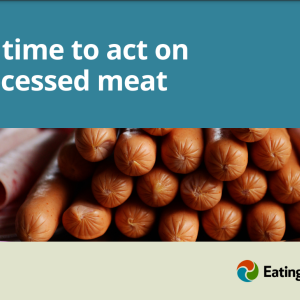
Processed meat currently makes up around 30% of average meat intake in the UK. This report outlines the negative effects that processed meat consumption has on both human and environmental health. It then sets out a series of policy recommendations for minimising its consumption
Summary
Processed meat has been cured, fermented, smoked or salted to improve the meat's flavour and shelf-life. According to the NOVA classification used by the authors, processed meats are either ‘processed foods’ (such as dried, cured and smoked meat) or ‘ultra processed foods’ (sausages, burgers etc.). NOVA advises that Ultra Processed Foods are minimised and processed foods are eaten sparingly. In the UK the National Diet and Nutrition Survey determined that one third of all the meat we eat is processed meat.
Minimising the consumption of processed meat will be essential to improve both environmental and health outcomes of the UK food system. The International Agency for Research on Cancer classified processed meat as a Group 1 carcinogen, meaning it directly causes cancer. Most commonly, processed meats are linked with bowl cancer, with one WHO IARC meta-analysis demonstrating that the relative risk of developing bowel cancer increases by about 18% with each additional 50g eaten per day, equivalent to one hot dog or two slices of ham (other studies have found the same result with as little as 25g). Processed meats also contain high levels of salt and sodium which are directly linked to high blood pressure, stroke and cardiovascular disease. The bar chart below outlines the increased risk of various health outcomes from daily processed meat consumption. No safe level of processed meat consumption has been established. Equally, it is unlikely that the UK will meet climate targets without significantly reducing the consumption of meat. The Committee on Climate Change, the UK government's independent advisory board on climate change, calls for a 35% - 50% reduction in meat consumption by 2050 as an essential step to meet environmental goals.

fig 1. Percent increase of relative risk associated with 50g increase of average daily processed meat consumption. Graph compiles findings from 12 systematic review studies that report dose-response associations with health and processed meat consumption.
The report sets out a series of policy recommendations for minimising processed meat consumption in the UK:
- Of the ninety countries worldwide with dietary guidelines, only 23% included recommendations on limiting meat consumption and 13% specifically recommended restricting processed meat. UK guidelines should be brought in line with countries such as Sweden who recommend avoiding processed meat where possible.
- Public sector institutional food services should set targets to minimise or eliminate processed meat from catering contracts. This could extend to school food standards and local authorities food and climate strategies
- Private sector retailers and food service operators should aim to reduce processed meat sales and support for sales through advertising and marketing. This could be regulated by including processed meat in legislation that restricts the promotion of food high in fat, salt and sugar.
- Health organisations can also play a pivotal role in improving dietary health, as they are regularly shown to be the most trusted source of information amongst the UK population. Targets should be set to eliminate processed meat in catering within these organisations and dietary recommendations published by these bodies should highlight the need to minimise processed meat consumption.
Read the full report here and our own explainers and blogs on UPFs







Post a new comment »